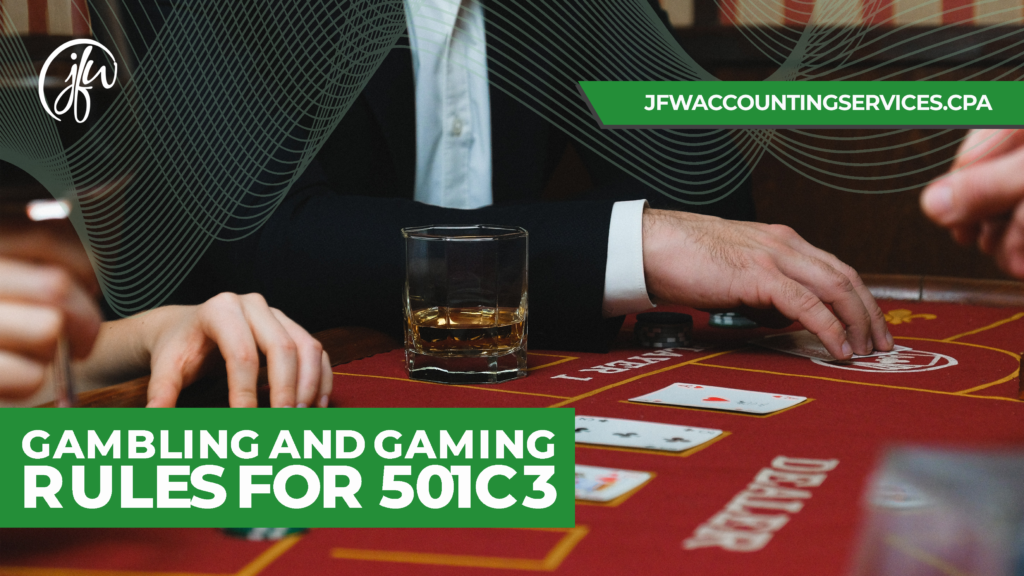Not-for-profits (NFP) are constantly coming up with creative new ways to fundraise. A great way to raise funds quickly is to host social events open to organization members and the community. Nonprofits can be very successful with events that feature gaming activities like bingo and poker nights. Raising money to support a charitable mission is commendable, but nonprofits must be aware of the federal and state compliance requirements when it comes to gaming activities.
In this article, we discuss the income generated from gaming activities as well as how to report it correctly.
What Is Considered Gaming?
Gaming activities describe games of chance and may include games of skill where payment is exchanged. Games of chance that fall under the gaming category:
- Scratch-off and pull-tab tickets
- Bingo games
- Keno games
- Casino games and card games
- Slot machines
- Raffles
Contests generally do not fall under the category of gambling because they are considered games of skill, where chance doesn’t determine the winner. Also exempt from being categorized as gaming are sweepstakes where the participant did not have to trade anything of value, like money, to enter.
Unrelated Business Income
Income generated from a trade or business activity that is not substantially related to the nonprofit’s exempt purpose may be subject to unrelated business income tax (UBIT). Income from an activity is unrelated business income if the activity constitutes a trade or business, is regularly carried on, and is not substantially related to the organization’s purpose.
Gambling proceeds at fundraising events generally fall into the category of UBI because they are considered noncharitable business activities that aren’t related to the mission of the organization and may or may not occur regularly. However, gaming activities may be exempt from UBIT if it meets any of the following criteria:
- Run by volunteers – Activities conducted with “substantially all” non-compensated volunteers.
- Bingo games – Games that don’t violate any laws and are played in a jurisdiction where bingo is not regularly carried on for-profit.
- Qualified public entertainment – Activities at a fair or expo promoting agriculture and education.
- North Dakota – Games of chance in North Dakota
State Laws
Each state has its own laws pertaining to gaming activities. Check with the state your organization holds its nonprofit status to understand state regulations. The state may require a special license or permit to conduct gaming activities. The state may also have specifications about what is considered gaming and what reporting is required. To find out more about the gambling and lotteries law in your state, check with the state governance site.
Bookkeeping
Non-profits that collect more than $1,000 in unrelated business income are required to report that revenue and related expenses on Part IV of Form 990 and file Form 990-T. Unrelated business income is subject to corporate tax rates and any organization expecting to have a tax liability over $500, must make estimated quarterly payments. Organizations that receive more than $15,000 in gaming revenues must report it on Schedule G, Supplemental Information Regarding Fundraising or Gaming Activities.
Funds raised from gaming activities are like all other nonprofit fundraising efforts, each financial transaction must be properly recorded. If required to submit Schedule G, the information will include the following:
- Total gaming gross receipts
- Prizes paid
- Event expenses
- Location of gaming activities
- Percentage of volunteer labor
- Contact information for responsible parties
Reporting
The Internal Revenue Service (IRS) requires nonprofits that hold gaming events to report some cash or non-cash winnings on Form W-2G, called Certain Gambling Winnings. The hosting organization may also be required to withhold certain federal and state income taxes from participants, as discussed in the next section. In order to have the information on hand for Form W-2G, the organization should collect and verify the following information from each gambling participant:
- Name
- Address
- Social Security Number
The limit an organization can payout to winners and be exempt from having to complete Form W-2G depends on the type of game. Winnings from keno more than $1,500, after deducting the wager, and any payouts on bingo and slots over $1,200, regardless of wager, must be reported on the W-2G. Poker tournaments where the organization pays out more than $5,000, after deducting the wager, must also be reported. The payout threshold for most other games is $600, when considering Form W-2G reporting.
Withholding
Some games and payouts also require that the organization withhold federal income taxes. Cash prizes greater than $5,000 awarded in sweepstakes, lotteries, raffles, poker games, and wagering pools require that federal income taxes are withheld. Other wagering games where the winnings exceed 300 times the original wager also require taxes to be withheld. There is no requirement to withhold income taxes for games of bingo, keno, slots, and poker tournaments when the winnings are reported on Form W-2G. Non-cash prizes are valued according to the market rate, and the taxes are paid by the winner or the organization hosting the event.
If the games and prize amounts warrant tax withholding, the IRS requires the following amounts:
- Standard transaction – 25%
- Winners with no tax identification number or social security number provided – 28%
- Nonresident aliens – 30%
- Non-cash prizes (nonprofit paying tax on behalf of winner) – 33.33%
Final Thoughts
Hosting casino nights, bingo tournaments, or other gaming events is a great way for nonprofit organizations to raise funds. However, engaging in gaming activities requires diligent recording, reporting, and withholding. Before hosting this type of event review the IRS regulations and the state laws regarding gambling. Reach out to JFW Accounting Services to help with reporting fundraising proceeds or determining if the income falls under the unrelated business income.

Jo-Anne Williams Barnes, is a Certified Public Accountant (CPA) and Chartered Global Management Accountant (CGMA) holding a Master’s of Science in Accounting (MSA) and a Master’s in Business Administration (MBA). Additionally, she holds a Bachelor of Science (BS) in Accounting from the University of Baltimore and is a seasoned accounting professional with several years of experience in the field of managing financial records for non-profits, small, medium, and large businesses. Jo-Anne is a certified Sage Intacct Accounting and Implementation Specialist, a certified QuickBooks ProAdvisor, an AICPA Not-for-Profit Certificate II holder, and Standard for Excellence Licensed Consultant. Additionally, Jo-Anne is a member of American Institute of Certified Public Accountant (AICPA), Maryland Association of Certified Public Accountants (MACPA), and Greater Washington Society of Certified Public Accountants (GWSCPA) where she continues to keep abreast on the latest industry trends and changes.

